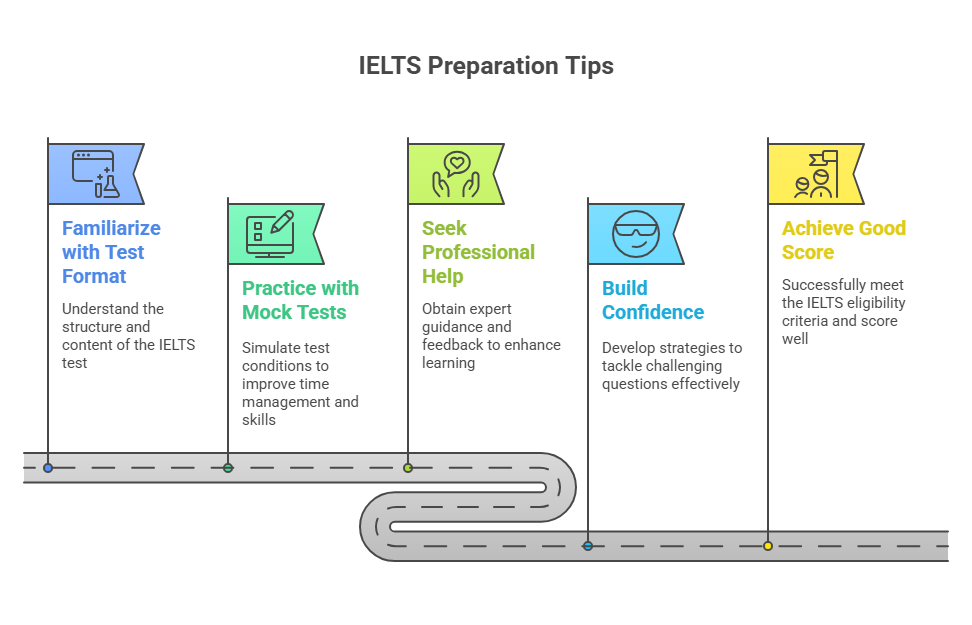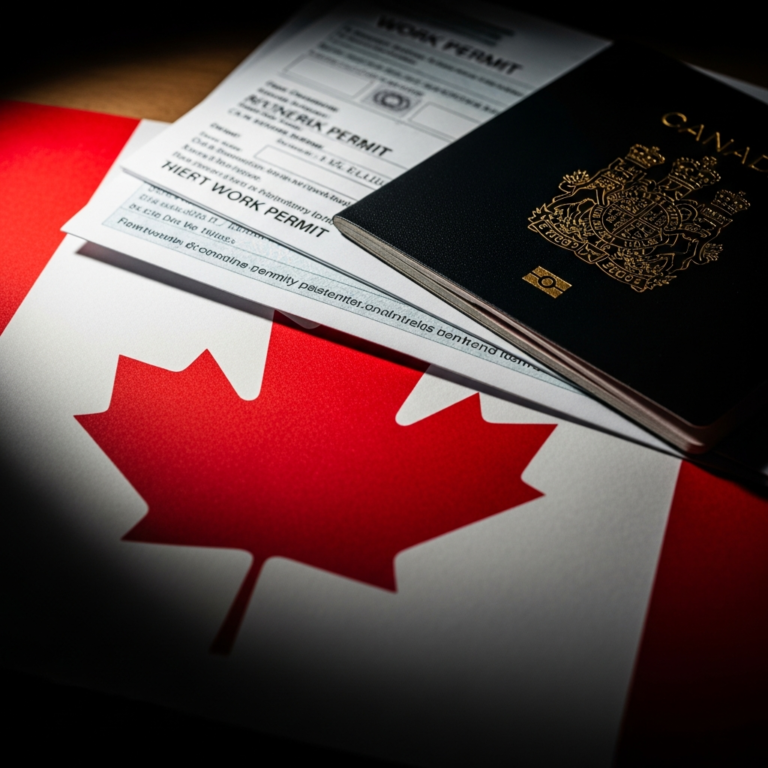Key Highlights of IELTS Eligibility Criteria
Here is a quick way to find out about IELTS eligibility:
- Age Limit: The minimum age to take the IELTS exam is 16 years old. There is not any top age limit for the test.
- Educational Qualification: You do not need to have a special educational qualification to sign up for the IELTS exam.
- No Strict Criteria: The IELTS eligibility criteria are open. Anyone who wants to show their English skills can take the IELTS exam.
- Test Types: You can choose the Academic test if you want to go into higher education. You can take the General Training test if you are going to work in another country.
- Score Requirements: The school or the group handling your immigration will tell you the minimum IELTS score you need. The IELTS group does not say what the minimum IELTS score should be.
- IELTS Exam Eligibility 2026: The key exam eligibility criteria will stay the same in 2026. These always depend on why you are taking this IELTS exam and what your chosen place wants.
Introduction
Are you thinking about studying, working, or living where people speak english? The IELTS exam helps you get to those places. It checks your english language skills. You need to know the ielts eligibility criteria before you start. This guide will tell you what to look for in 2026 for ielts eligibility. You will read about age, your school background, and the english language proficiency scores that many top spots ask for. This way, you will get the info you need. You can feel good and ready when you start your journey.
What is the Official IELTS Eligibility Criteria?
Many people want to know about the official IELTS eligibility criteria. The International English Language Testing System does not set strict eligibility rules. The test can be taken by anyone. It is for those who need to show their english language skills for school, work, or moving from one country to another. The eligibility requirements mainly come from the school, job, or immigration office that you apply to. So, you need to check the age, identification, and score rules that your school, job, or immigration office wants. This way, you will know what level of english language proficiency they want, and if you meet the IELTS eligibility in this language testing system.
Age Limit: Minimum & Maximum
- The IELTS exam does not set an age limit. But, people should be at least 16 years old. The test is made for people with some school and life experience.
- If you are under 16, you may find the reading and writing tasks hard. So, check if you feel ready before you go for the IELTS exam.
- This is advice for all the candidates. Indian students and others get fair IELTS eligibility.
- There is no maximum age limit for the IELTS exam. Anyone, at any age, can do the test to show their English proficiency for visas, work, or school.
Educational Qualification Requirements
- There is no minimum educational qualification you need to take the IELTS exam. Anyone can sign up for it, no matter what their academic background is.
- The IELTS exam is open to people who finished high school, people who are in college, or anyone with higher degrees.
- The IELTS exam is there to check your english language proficiency. It only tests your skills in the english language and does not check your education level when you register.
- But, some colleges or universities may want a certain educational qualification with your IELTS score. So, always look into what they need before you apply.
Rules for Nationality, Citizenship, and Valid ID Proof
- The IELTS exam is open to people from any country or citizenship. There are no limits to who can take it, no matter where you come from.
- You must have valid identification for both IELTS registration and on the exam day. In most countries, like India, the only accepted ID is a current passport.
- You must use the same passport both for IELTS registration and when you go to the test center. If you do not have this passport, you cannot take the IELTS exam.
- Make sure your passport is valid, and all the details match your IELTS registration information. This strict check at the test center is there to keep things fair and safe for everyone.
How Many Times Can You Take the IELTS?
You can take the ielts test as many times as you want. There is no set limit on how often you can try the ielts test. You can sign up for the test again whenever you feel ready. You do not have to wait between tests. Every time you want to do the ielts test, you need to register again and pay the fee.
You can now use the new IELTS One Skill Retake feature if you want to do better in just one part of the ielts test. You do not have to take the whole test again. You can pick one skill to retake, like Listening, Reading, Writing, or Speaking. This way, if you already took the full ielts test in the past, you can choose to work on only the skill you want to improve. The skill retake is good for people who want to get a better score in one part.
Choosing the Right Test: Academic vs General Training
A big part of IELTS eligibility is picking the right kind of test. You get to choose from IELTS Academic or IELTS General Training. The rules for both tests are the same, but what they cover is not. If you want to go to a university, you should choose IELTS Academic. If you plan to work in another country, IELTS General Training is better. It is good to know how general training and academic tests are different. This way, your test results will fit what you want to do next.
Who Needs the IELTS Academic Test?
The IELTS Academic test is for people who want to study at a university or college in a place where people speak english. It is also for those who need professional registration. This test checks if your english language skills are good enough for higher education. You will find topics that are about academic life. You should take the IELTS Academic test if this is what you need.
- You want to start the bachelor’s or master’s in another country.
- You need to get admission in the postgraduate diploma or certificate course.
- You need professional registration in the area you want to work.
- You are a student. You have to meet the english language rules if you want to get a scholarship.
Who Needs the IELTS General Training Test?
The IELTS General Training test is made for people who want to live or work in places where English is spoken, like New Zealand, Australia, Canada, or the UK. This test checks if you have the English skills you need to get by in daily life or at work. The test is not made for people who want to study at a university. Many people take the IELTS General Training when they want to move to another country, get a work visa, or join a program that does not give a degree.
You have to choose the IELTS General Training test if you are:
- Moving to a country where people speak English, such as Canada, Australia, or New Zealand.
- Wanting to get a job in another country or trying to get a work visa.
- Signing up for high school or a training class that does not give a degree.
- Wanting to show your english proficiency for immigration.
IELTS Score Requirements
There is no single “passing” IELTS score. Each school and program picks the minimum band score you need. The score may be different for each country, school, or program that you are interested in. The IELTS score uses a 9-band scale. Every band shows how good your english proficiency is. You should find out the minimum score or minimum band score needed for your chosen place. Top schools may ask for a higher band score. Knowing these rules will help you to get ready and do your best on the test.
Minimum IELTS Scores for Canadian Student Visas & PR
Canada has some ielts requirements that you need to meet for student visas and PR. If you are applying with the Student Direct Stream (SDS), you must get at least 6.0 overall in IELTS, and also at least 6.0 in each section. If you choose the Non-SDS route, your scores depend on the school you want to go to. It is better to have higher scores to get in.
For PR, such as Express Entry, getting a higher IELTS scores can make your points go up in the system. Below is a simple summary of ielts requirements that most people want to know about.
Program/Purpose | Overall IELTS Score (Academic/General) | Minimum Score per Band |
|---|---|---|
Student Direct Stream (SDS) | 6.0 (Academic) | 6.0 in all bands |
Undergraduate Programs | 6.0 (Academic) | Typically 5.5+ |
Postgraduate Programs | 6.5 (Academic) | Typically 6.0+ |
Express Entry (PR) | Varies (General Training) | Higher scores yield more CRS points |
Accepted IELTS Bands for Top Universities in the USA, UK, and Australia
- Many top universities in the USA, UK, and Australia ask for a high minimum IELTS band if you want to get in. A lot of them want you to have an IELTS score of at least 7.0. For example, Harvard University needs you to get a minimum IELTS band of 7.0.
- UK schools, like Oxford, want you to get an IELTS band of at least 7.5 for many programs. Cambridge mostly expectsa 7.0 IELTS score.
- Big Australian universities, like Melbourne and Sydney, look for an IELTS score between 6.5 and 7.0. Always check the official course page so that you know the most up-to-date minimum IELTS band needed.
Score Requirements for Spouse/Dependent Visas
- Many countries ask that people who want a spouse or dependent visa show basic English skills.
- For example, if you want to live in the UK or Australia, you need a minimum IELTS General Training score. You usually have to get between a 4.0 and 5.0 band on the general training test to apply.
- Always check the official immigration website to see what is needed. If you do not have the minimum IELTS general training score, it can delay your visa or you might not get it at all.
Tips to Meet IELTS Eligibility Criteria

The IELTS eligibility criteria are simple. But it is not easy to get the band score that you want. Use these tips to help you get ready for the test in a better way.
- Get familiar with the test format. This way, you know what is there and what to look for.
- Practice with mock tests. This helps you use your time in a good way and get better at what you need to do.
- Find professional help. It helps you learn better and get feedback for your work.
- Build up your confidence by making good plans for tough questions.
If you practice the right way, you can get a good score in the IELTS exam in 2026.
Conclusion
To sum up, it is very important for each student or person to know the IELTS eligibility criteria before taking this exam. Be sure to look at the eligibility criteria for things like your age, education, country, and the IELTS score you need before you apply. This step will help you stay out of trouble with your application. It does not matter if you pick the Academic test or the General Training one. You must follow the IELTS eligibility to do well. If you feel lost about how to prepare, or you want to learn more about the eligibility criteria, talk to USCA Academy for advice. A good IELTS score starts with having the right details and being ready.
Frequently Asked Questions
1. Can I take IELTS in class 10 or 12?
Yes, you can take the IELTS exam if you are in class 10 or class 12. You do need to be at least 16 years of age to sit for the test. This is the minimum age limit for the IELTS exam. There is no maximum IELTS age limit. That means your IELTS eligibility does not go away as you get older. The IELTS eligibility for study abroad will stay the same for people of all ages.
2. Can I take IELTS without a bachelor’s degree?
You do not need any special educational qualification to take the IELTS exam. Exam eligibility does not require you to have a degree. If you have the right age and the right ID, you can sign up for the IELTS exam. This ielts exam eligibility is the same for everyone, including ielts exam eligibility for Indian students.
3. How does USCA Academy help students prepare for IELTS?
USCA Academy gives help to students who want to improve. The team has expert coaching to guide you every step of the way. You get easy-to-use study materials for your practice. There are regular mock tests, so you can practice and feel ready. USCA Academy helps you grow your language abilities and find study plans that work. With this, you feel good as you work towards better test results. The academy supports you, so you feel ready to meet the IELTS requirements for your education.
4. How often can I attempt IELTS in a year?
You can take the IELTS test as many times as you want in a year. There is no limit. You can do a new IELTS registration whenever you feel ready, or if you want to get a better score. If your test center offers it, you can use the IELTS One Skill Retake. This lets you retake just one part of the IELTS test.









